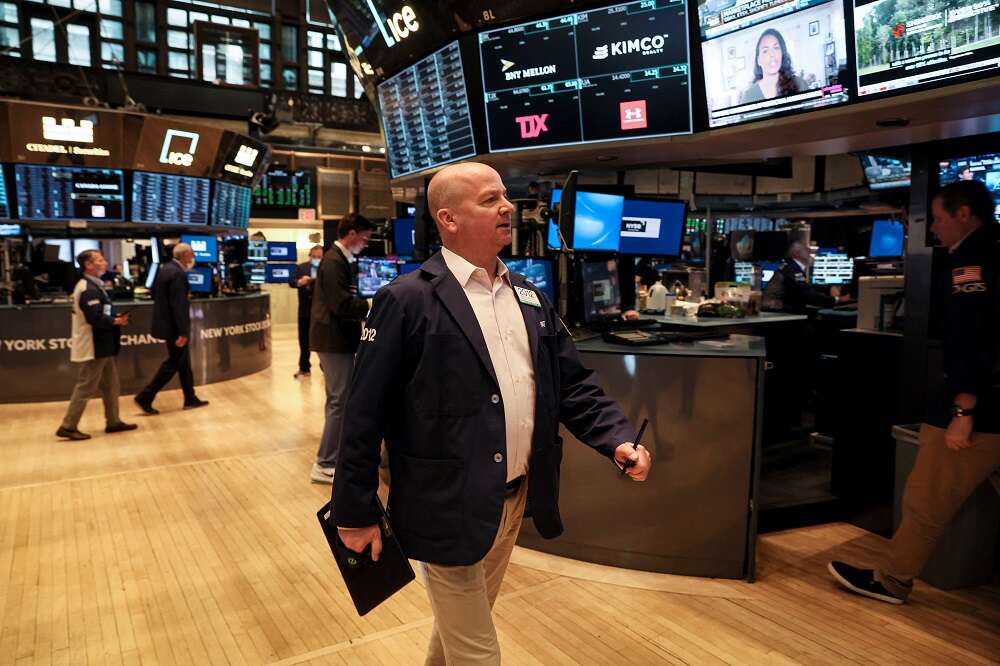
By Sinéad Carew
NEW YORK (Reuters) – Stock indexes around the world fell sharply on Monday and the dollar reversed course after hitting a two-decade high while oil prices sank as concerns about slowing growth and a tightened lockdown in Shanghai pushed investors toward safer bets.
Oil prices tumbled almost 6% on Monday as continued coronavirus lockdowns in China, the top oil importer, fed worries about the demand outlook.
U.S. Treasury yields eased on Monday after the benchmark 10-year note earlier hit fresh 3-1/2 year highs as inflation fears continued to roil markets and traders readied for consumer price data and the auction of $103 billion in new government debt later this week.
After Friday’s bruising sell-off, U.S. stocks sold off sharply on Monday with investors rushing to protect themselves against the prospect of a weakening economy.
“With slowing growth, regardless of a recession or not, you’re going to see multiple compression for anything that’s growth related. It’s not necessarily an indictment of their fundamentals. It’s an indictment of their multiples,” said Michael James, managing director of equity trading at Wedbush Securities in Los Angeles.
“Investors are far more concerned with capital preservation at this point, and you’re more concerned with raising cash in the event the macro environment worsens.”
Central banks in the United States, Britain and Australia all raised interest rates last week, and investors were bracing for more tightening as policymakers fight soaring inflation.
“Markets are continuing to re-price inflation risks as it becomes more evident that inflation is likely to be with us for longer than some people had hoped,” said Chris Zaccarelli, chief investment officer at Independent Advisor Alliance in Charlotte, North Carolina, also citing increasing recession risks.
And he sees policy tightening around the world adding to economic “slowdown pressures that are already building due to the lockdowns in China and the war in Europe.”
The Dow Jones Industrial Average fell 499.33 points, or 1.52%, to 32,400.04, the S&P 500 lost 112.72 points, or 2.73%, to 4,010.62 and the Nasdaq Composite dropped 473.33 points, or 3.9%, to 11,671.34.
On Monday the S&P hit its lowest level in more than a year while Nasdaq’s trough for the session so far was its lowest point since November 2020. Both the S&P and Nasdaq on Friday posted their fifth straight week of declines – their longest losing streaks in roughly a decade. [.N]
MSCI’s gauge of stocks across the globe shed 2.76% on Monday, hitting its lowest level since December 2020, while emerging market stocks lost 1.62%.
GLOBAL CONCERNS
Investors were focused China’s zero-COVID policy, with Shanghai tightening the city-wide lockdown for 25 million residents. The policy prompted concerns about supply chain problems as many technology companies manufacture their products in China.
While Vladimir Putin on Monday exhorted Russians to battle, he was silent about plans for escalation of the war in Ukraine, where there was no let-up in fighting. Kyiv described a stepped-up Russian offensive in the east and a push to defeat Ukrainian troops in a steelworks in Mariupol. {nL2N2X1018]
With investors juggling so many worries, one place they were looking for safety was in the dollar index.
The index, which measures the dollar against a basket of currencies, had earlier risen 0.6%, hitting the latest in a string of 20-year highs.
The dollar index fell 0.058%, with the euro up 0.05% at $1.0556. The yen strengthened 0.17% to the dollar at 130.35.
Dollar strength also put pressure on Latin American stocks and currencies on Monday. The Mexican peso lost 1.00% versus the U.S. dollar at 20.36.
U.S. crude recently fell 5.94% to $103.25 per barrel and Brent was at $106.04, down 5.65% on the day. [O/R]
Spot gold dropped 1.5% to $1,854.77 an ounce. U.S. gold futures fell 0.94% to $1,857.10 an ounce. [GOL/]
(Reporting by Sinéad Carew in New York; Additional reporting by Tommy Wilkes in London; Wayne Cole in Sydney; Editing by Chizu Nomiyama, Lisa Shumaker and Nick Macfie)


